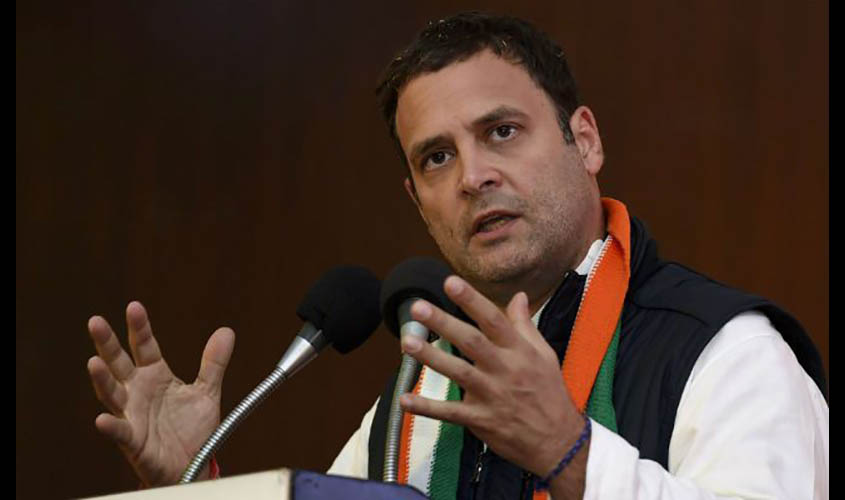Congress president Rahul Gandhi has given both Prime Minister Narendra Modi and the BJP chief, Amit Shah a reason to smile. He, despite being a principal Opposition leader, has inadvertently or consciously provided his opponents enough ammunition to demolish any chances his party may have had in redeeming itself in the 2019 Parliamentary polls.
During his recent trip to Germany and the United Kingdom, Rahul, through his bizarre statements and illustrations, has beyond any doubt demonstrated that he was totally unprepared to lead the country. He has drawn incoherent linkages regarding issues, and has attempted to irreverently compare the Rashtriya Swayamsevak Sangh (RSS) to the radical Muslim Brotherhood, which in several countries has been classified as a terror outfit. In the process, he has walked into the saffron trap, and many in the Congress itself have pronounced him as the BJP’s star campaigner.
There are multiple points that get raised while analysing Rahul’s recent foreign trip, undertaken at the invitation of reputed organisations, such as the Institute of Strategic Studies (IISS) and the London School of Economics. Firstly, he had not been adequately briefed on the subjects he was speaking on. Secondly, not sufficient homework had been done for him to go into the background of issues that he sought to take on. Finally, most important is the fact, that since by his own admission, he has repeatedly said that he wants to with dignity and decorum pursue public life, where was the need to wash dirty domestic linen on foreign soil?
It is a fact that the politics of raising domestic matters overseas was initiated by Narendra Modi during his public interactions in the United States and the UK. However, does this provide a licence to the Congress to replicate this aberration in the political discourse of the country; this is inconsistent with the traditions that had been followed in the past. The healthy convention prior to this deviation was that while abroad, political leaders irrespective of their parties, would project a united stand, and if they harboured sharp differences, they were to be settled on designated forums, such as Parliament.
Many years ago, P.V. Narasimha Rao as Prime Minister had sent Atal Bihari Vajpayee, then a frontline Opposition leader, to lead the Indian delegation to a United Nations platform. Salman Khurshid, a Minister in the Union government, was a part of the entourage which was spearheaded by Vajpayee. Needless to say, the Indian contingent accomplished their mission with flying colours returning home without, in an alien environment, sparring with each other. That is the spirit which needs to be revived.
Unfortunately those who have been aiding and advising Rahul have chosen a path never followed by any other Congress leader in the past. They are unaware of the rich legacy of the party that has been nurtured by luminaries such as Mahatma Gandhi, Jawaharlal Nehru, Subhas Chandra Bose and Vallabhbhai Patel amongst others. Therefore, by adopting a strategy which was in variance with the accepted norms, they have allowed the Congress to be further relegated in the political space.
To his credit, Rahul did raise several important points but was criticised on account of his creating inconsistent linkages. As an illustration: how are joblessness and lynching interrelated? As stand-alone issues both unemployment and lynching are extremely relevant, and can be acutely disconcerting for the government, but once a connection is attempted to be established, it makes light of the entire argument. In the past, the RSS by many of its adversaries has been accused of being fascist, yet no one has ever denounced it as a terrorist organisation.
In fact, Rahul’s father, Rajiv Gandhi, and grandmother, Indira Gandhi, shared a comfortable rapport with the RSS, which in the overall interest of the country latently supported the Congress, both in 1980 and 1984. Nehru was an open critic of the RSS and still invited its contingent to participate in the Republic Day celebrations of 1963 so as to acknowledge its immense contribution in the civil defence duties during the Indo-Chinese conflict. Bracketing the RSS with the Muslim Brotherhood diluted Rahul’s larger point, which was that the Sangh was trying to infiltrate several government institutions for the expansion of its influence.
Rahul needs to know that the media coverage to his trips, both in the country and abroad, is tactically and selectively facilitated by his BJP opponents so as to showcase him in diminished light. On occasions, his statements are twisted, and thus convey a completely different meaning from what he intended to say. This happens because those counselling him are themselves unacquainted with pivotal political matters, and go by theoretical assumptions. Sam Pitroda, for instance, can be a close family friend who facilitated the Telecom Revolution but he is not a person who comprehends the Machiavellian genre of our politics. Same is the case with many leaders who are supporting Rahul for the furtherance of their own political careers. Their primary objective is to usurp key positions, through his patronage, rather than working their way up in the political arena. The Congress president must work on strengthening the organisation’s infrastructure that during his predecessor’s time had become enfeebled. He could consider maintaining a low-profile, since his much-publicised visits abroad have not reaped any political dividends. By remaining in the news, he simply is assisting the BJP. Between Us.

